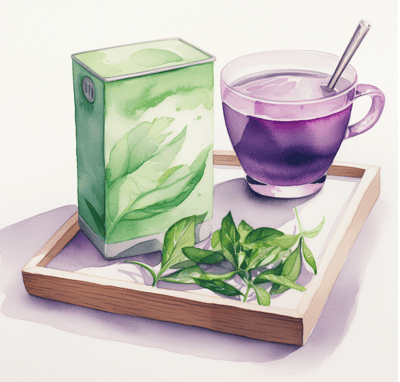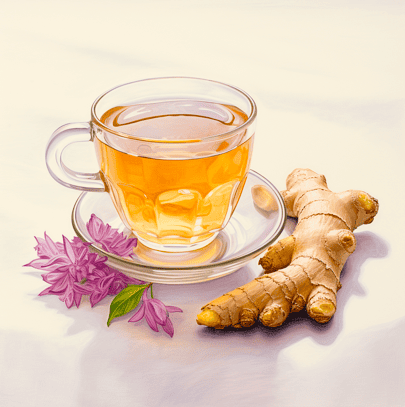
Is detox tea good for your liver? Unfortunately, not understanding the real scientific evidence concerning detox teas can put your health at real risk. Keep scrolling to learn the dangers, and three teas that are both safer and proven to aid in weight loss and health.
Hi, I’m Hazel
I gave up on skincare after years of issues with acne and sensitive skin.
But after going plant-based, my skin cleared up and even started to glow. Now I help women reveal their natural beauty with simple, delicious plant-based food.
I also used to be a nurse, and love nerding out on nutritional science (high-quality science, that is).

As usual, this post is based on the strongest nutritional evidence I could find with a focus on the simplest, most delicious foods
…because who has time to waste on actions that don’t work?
The quick version:
Detox teas might not be the miracle solution for liver health they’re often marketed as. While they promise to cleanse and rejuvenate your liver, the scientific evidence supporting these claims is weak, and multiple women have been hospitalised with liver damage after starting a routine.
Better alternatives for health and weight loss include hibiscus, ginger, and green tea.
What are Detox Teas?
Detox teas are popular beverages marketed with the promise of cleansing toxins from your body, enhancing liver work, and promoting healthy liver function.
These teas often contain a mix of common ingredients ranging from herbs to natural laxatives, designed to initiate a daily detox.

Claims vs. Facts
While the labels might list natural ingredients and promise to support liver health, the real story isn’t always so straightforward.
Many of these teas are part of a broader detox diet craze, which sounds appealing but lacks substantial scientific research to back up its claims.
It’s crucial to sift through the marketing and understand the potential hepatotoxic effects these ingredients might have on your body.
How the Research Is Poor Quality
When it comes to your health, relying on poor-quality evidence is like building a wardrobe full of trendy but poorly made clothes—they may look good at first glance but quickly fall apart under scrutiny.
Let’s explore why solid research is crucial before incorporating detox products into your health and beauty regime.
Limited Clinical Evidence

Despite the big buzz around detox products, the actual proof (high-quality scientific evidence) that they clean out our livers and boost health is surprisingly thin. Most studies out there are small and not very well-done, which makes it hard to trust what they say (1).
Imagine you heard from a few friends that a new blockbuster movie is fantastic, but later you find out they were all given free tickets and popcorn! That’s a bit like some of the studies on detox drinks—the setups often make you wonder if you’re getting the real story (1).
And without big, solid studies, specifically those randomised controlled trials where people are randomly chosen to either use the detox product or not, it’s tough to say if these teas truly help liver health or just make a good sales pitch.
Better Proof is Needed
Right now, the glowing claims about detox teas helping with liver cells and healthy liver function feel like they are based more on wishful thinking than hard facts.
Until more thorough and larger studies are done, it’s wise to stay skeptical about any detoxification teas that promise to fix your liver overnight. After all, if it sounds too good to be true, it probably is—especially when it comes to quick health fixes!
You may also like: Does Detoxing Cause Acne? From Acne Woe to Glow
Warning! Real Cases of Liver Damage
Here are some eye-opening real-world stories of women who learned the hard way that detox teas aren’t always harmless. These cases highlight the serious risks and underline why it’s crucial to approach these popular products with caution.

Woman 1
Imagine sipping on a tea you thought was good for you, only to end up in the emergency room.
That’s what happened to a 51-year-old woman who drank a popular liver cleanse tea. Instead of getting the health boost she hoped for, she developed severe symptoms like unsteadiness and headaches, which were directly linked to her tea habit (2). After a bout in intensive care, she fortunately was able to recover.
Woman 2
This one is a heartbreaker: a 60-year-old woman drank a tea that claimed to protect and support the liver for two weeks. Sadly, the very product meant to guard her health led to acute liver injury (3).
She drank this tea three times a day, trusting the liver-supporting ingredients it boasted, but it contained harmful chemicals that did the opposite. Her story ended tragically. After two weeks she needed a transplant, but she ended up passing away a couple days after that.
Her story emphasises that what’s marketed as healthy can sometimes be deadly.
Woman 3
You wouldn’t expect a young, healthy 36-year-old woman though, to face liver issues from a trendy detox brew, right?
Well, think again. She used a detox tea for a month, hoping to enhance her liver function. Instead, she ended up with alarming liver tests and severe stomach pains (4).
Her ordeal is a stark reminder that even younger folks need to tread carefully with health trends, as the promise of detox can sometimes lead to unexpected detours.
These real-life cases paint a sobering picture of the risks associated with detox products, underscoring the importance of being cautious and informed. While the teas might promise a quick fix for liver health, they can sometimes lead to serious liver damage, turning a wellness journey into a health hazard.
You may like: Eating More to Weigh Less: Fruity Freedom
Essential Liver Functions
The liver is your body’s natural detox centre, tirelessly filtering toxins from everything you consume. It’s like the body’s filter, cleansing your blood of harmful toxins and converting them into waste products, which your body can then safely eliminate. It also helps metabolise nutrients and medications, making it essential for overall health.
Your liver is very important. You must protect it!
Risks of Overburdening the Liver
Detox teas might promise a quick cleanse, but they can actually put extra strain on your liver.
Some harmful ingredients found in these teas can lead to liver fat buildup, making it harder for your liver to function properly. This can increase your risk of developing nonalcoholic fatty liver disease, a condition where fat builds up in the liver, not due to alcohol, which can be detrimental to your health if left unchecked.
Natural Ways to Support Liver Health
Instead of turning to trendy teas, consider natural remedies and lifestyle choices that truly nurture your liver.
Foods rich in antioxidants, like berries, nuts, and green leafy vegetables, can help support liver function without the risks associated with harmful chemicals. A healthy dietcan be a tasty alternative! Regular exercise and staying hydrated also play a crucial role in maintaining a healthy liver.
3 Better Teas for Your Weight Loss and Health
Incorporating herbal teas into yourdiet is one of the best ways to support liver health and enhance overall wellness. Here are three standout options that taste great and are supported by high-quality evidence:
Floral Hibiscus Tea

Unlike many commercial detox teas, hibiscus tea has shown promising results in legitimate scientific studies. In a creative approach to a randomised double-blind trial, researchers used hibiscus in a powdered form, encapsulated to compare effectively against a placebo (5).
After 12 weeks, participants taking hibiscus experienced a notable reduction in waistlines and body fat percentage. This suggests that hibiscus could be a beneficial addition to a health-focused diet, particularly for those looking to manage their weight naturally.
Hibiscus is also super high in antioxidants, which is great for that natural skin glow!
You may also like:
Hibiscus vs green tea: Which is better for beauty?
Ground Ginger Tea

Ground ginger, another powerhouse, has been studied for its health benefits in a similar fashion.
Participants consumed a teaspoon of ground ginger powder daily, encapsulated to mask the taste and ensure a blind testing scenario (6).
After 12 weeks, the ginger group saw a significant decrease in body mass index compared to those who received a placebo. Although the reduction in body fat was minimal, the findings highlight ginger’s potential role in a healthy lifestyle, particularly in weight management.
As an added bonus, ginger is great for managing pain including menstrual cramps and PMS (7).
You may also like:
5 Ways With Lemongrass and Ginger Tea
Skin-nourishing Green Tea

Green tea is well-known for its health benefits, including weight loss support.
In one study, two groups consumed the same number of calories, but one group also drank green tea.
Over eight weeks, the green tea group lost significantly more weight—an average of 10 pounds—compared to the 4 pounds lost by the control group (8). However, it’s important to note that larger studies suggest the weight loss effects of green tea are relatively modest and may not be significant for everyone (9).
These examples of herbal tea blend and natural ingredients highlight safer alternatives that support a healthy lifestyle without the risks linked to detox teas. They have the added benefits of reducing oxidative stress and inflammation which is great for your skin and premature ageing.
Is detox tea good for your liver?
While detox teas are often marketed with promises of cleansing and rejuvenating the liver, the truth is less clear and potentially concerning. Solid evidence supporting these claims is scant, and the risk of liver damage from certain ingredients cannot be ignored. Instead of relying on quick fixes, embracing proven, natural alternatives like hibiscus, ginger, and green tea is a safer and more effective way to support liver health and promote good health. Remember, when it comes to maintaining a healthy lifestyle, the best choices are informed by solid science, not just trendy claims. The good news is that making informed, healthier choices can lead to lasting benefits without the risks.
References
Most references below will link to the original peer-reviewed study itself. However, sometimes I will link to a video over at NutritionFacts.org instead, which is by far the single best resource of brutally transparent nutritional evidence you will ever see. Dr Greger tells a great story about the realities of the science and if I think you will benefit more from one of his videos, the link will take you there instead.
Happy nerding!
- Klein AV, Kiat H. Detox diets for toxin elimination and weight management: a critical review of the evidence. J Hum Nutr Diet. 2015;28(6):675-686. doi:10.1111/jhn.12286
- Gillett G, Shivakumar N, James A, Salmon J. Acute Severe Hyponatremia Following Use of “Detox Tea”. Cureus. 2021;13(3):e14184. Published 2021 Mar 30. doi:10.7759/cureus.14184
- Kesavarapu K, Kang M, Shin JJ, Rothstein K. Yogi Detox Tea: A Potential Cause of Acute Liver Failure. Case Rep Gastrointest Med. 2017;2017:3540756. doi:10.1155/2017/3540756
- Niazi B, Ahmed K, Ahmed M, Ali S, Song K, Elias S. Drug-Induced Liver Injury from Herbal Liver Detoxification Tea. Case Rep Gastroenterol. 2022;16(3):612-617. Published 2022 Nov 8. doi:10.1159/000526311
- Chang HC, Peng CH, Yeh DM, Kao ES, Wang CJ. Hibiscus sabdariffa extract inhibits obesity and fat accumulation, and improves liver steatosis in humans. Food Funct. 2014;5(4):734-739. doi:10.1039/c3fo60495k
- Ebrahimzadeh Attari V, Ostadrahimi A, Asghari Jafarabadi M, Mehralizadeh S, Mahluji S. Changes of serum adipocytokines and body weight following Zingiber officinale supplementation in obese women: a RCT. Eur J Nutr. 2016;55(6):2129-2136. doi:10.1007/s00394-015-1027-6
- Ozgoli G, Goli M, Moattar F. Comparison of effects of ginger, mefenamic acid, and ibuprofen on pain in women with primary dysmenorrhea. J Altern Complement Med. 2009;15(2):129-132. doi:10.1089/acm.2008.0311
- Auvichayapat P, Prapochanung M, Tunkamnerdthai O, et al. Effectiveness of green tea on weight reduction in obese Thais: A randomized, controlled trial. Physiol Behav. 2008;93(3):486-491. doi:10.1016/j.physbeh.2007.10.009
- Jurgens TM, Whelan AM, Killian L, Doucette S, Kirk S, Foy E. Green tea for weight loss and weight maintenance in overweight or obese adults. Cochrane Database Syst Rev. 2012;12(12):CD008650. Published 2012 Dec 12. doi:10.1002/14651858.CD008650.pub2